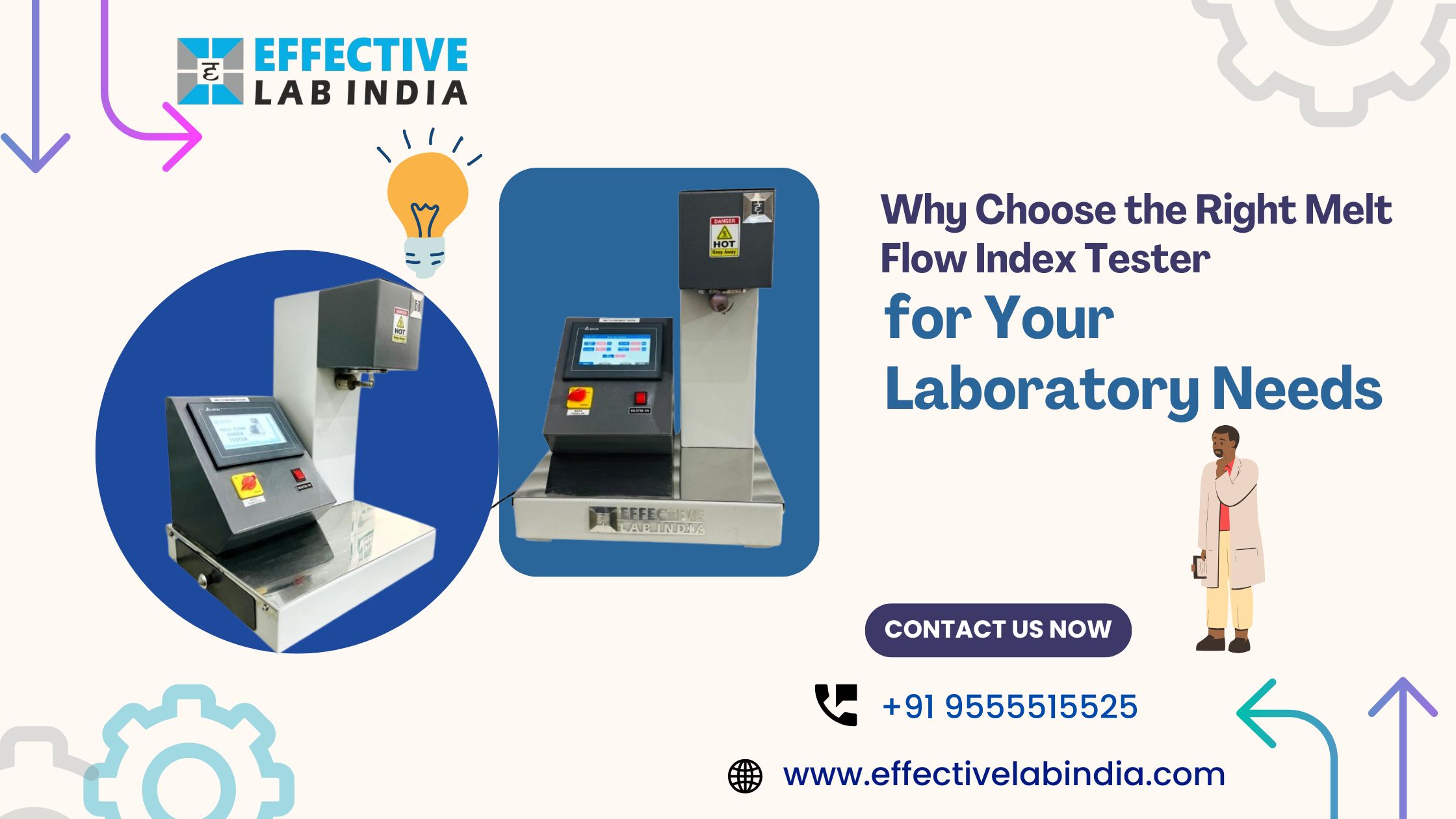Why Choose the Right Melt Flow Index Tester for Your Laboratory Needs

Strong 8k brings an ultra-HD IPTV experience to your living room and your pocket.
At Effective Lab India, we understand that choosing the right and accurate equipment for your laboratory is not easy. Choosing a machine for your company is not just about purchasing; it is also about investing in the accuracy, efficiency, and quality of your product and the quality of your work. Today, we will examine the features, uses, and how to choose the best Melt Flow Index (MFI) testers - a must-have tool for any organisation working with thermoplastics.
If you are looking to buy an MFI tester, with so many options available, how do you choose an instrument that suits your laboratory's specific needs? Let's understand it simply and straightforwardly.
What Exactly is a Melt Flow Index Tester?
Before we go to the fundamentals of choosing the right one, let's quickly understand what an MFI Tester is doing. In the simplest words, it measures how easily a melted plastic material flows through a small opening (a die) under specific conditions with temperature and pressure. It is expressed as "simple flow", that Melt Flow Rate (MFR) or Melt Flow Index (MFI), usually in (g/10 min), grams per 10 minutes.
Why is this important? Because the MFI value tells you a lot about the polymer's molecular weight, viscosity and finally its processability. A high MFI means that the material flows easily, making it suitable for processes such as injection molding. A low MFI indicates a thick, more viscous content, often preferred for extrusion processes. Knowing this helps you:
- Choose the correct material for a specific application.
- Provide stability between different batches with raw materials.
- Customise your production processes to avoid problems such as an uneven filling or weak products.
- Comply with industry standards such as ASTM D1238 and ISO 1133.
Type of MFI Tester: Manual, Semi-Automatic, or Fully Automatic?
This is often the first major decision when choosing the right instrument. Here, your choice depends on the testing volume, budget and desired automation level.
Manual MFI Testing Machine: These are generally the cheapest and are great for laboratories with lower testing volumes or for educational purposes. The operator loads the sample manually, applies weight and cuts the extruded material. While accurate results can be achieved, they require more operator participation and can introduce a certain human variability.
Ideal for: Start-up, small production units and educational institutions.
Semi-Automatic MFI Testers: Providing a good balance between cost and efficiency, a semi-automatic model often contains motorised weight load and sometimes automatic cutting. It reduces human errors and speeds up the test process. You still have some manual controls, which can be beneficial for specific applications.
Ideal for: Medium-sized laboratories and companies that are looking for better efficiency without going completely automatic.
Fully Automatic MFI Testers: If you want to test a larger quantity, a fully automated MFI tester is a very essential instrument for it. These machines usually come with touch screen control, automatic sample cutting, integrated weighing balances and data logging options. They reduce human intervention and ensure high accuracy, repeatability and fast throughput. Effective Lab India also provides PC connections for advanced integration with data analysis and laboratory information management systems (LIMS).
Ideal for: Large manufacturing facilities, R&D laboratory and the high-value quality control department with high-value test requirements.
Prominent factor to consider before purchasing a melt flow index tester
Adaptability of test standards: Make sure the tester is in accordance with ASTM D1238, ISO 1133, or both, depending on customer and market requirements.
- Temperature range and accuracy: For polymers such as PP, PE, PS or high-temperature engineering plastic, the tester must cover a sufficient temperature range (usually up to 400 °C) with a ( ±0.1°C F.S.D.) accuracy.
- Load option: Confirm the weight area delivered. The standard load for different polymers and test conditions varies from, e.g., 2.16 kg, 5 kg.
- Ease of use: Features such as touch screen display, intuitive software and automatic cuttings reduce human error and improve efficiency.
- Maintenance and cleaning: Choose a design that allows easy machine cleaning and barrel and die saving time between the tests.
- Data recording and connectivity: Modern testers offer USB, RS-232 or Bluetooth connection, and allow data transfer to LIMS or PCs for seamless reporting.
- Build Quality: A strong tester made with high-quality mild steel barrel, corrosion-resistant finish, and accurate machining ensures long service life and repeated performance.
- Manufacturer Support: Consider the availability of after-sales support, calibration services and spare parts availability.
- Resolution: A higher resolution (e.g., 0.1°C) means more reliable temperature maintenance.
Applications of Melt Flow Index Testing in Industries
- Let us see where and why MFI testers are used, knowing this will make your buying decision clearer:
- Plastic manufacturing units – Used for testing batches of polymer particles.
- Thermoplastic Plastic product manufacturers – This machine helps to ensure that the input material has the desired flow rate.
- R&D laboratories – For material formulation studies and new polymer development.
- Recycling plants – To test reprocessed materials for consistency in processing.
- Rubber Industry: Melt flow index instrument is very useful in checking the hardness and elasticity of rubber in the industry.
Why Choose Effective Lab India’s Melt Flow Index Tester?
Effective Lab India is a reputed company in India that manufactures the best quality Laboratory Melt Flow Index Testers. These testers are manufactured as per ASTM and ISO standards. The features are as follows:
- High working temperature (±0.1°C) - for accurate and stable results
- Automatic and manual models - as per your requirement
- Robust construction - For long-lasting uses
- User-Friendly Interface with Digital Display - easy to operate by everyone
- Fast after-sales service and calibration support are free for 1 Year
- Competitive and lowest Melt Flow Index Tester Prices in India
Effective Lab India designs its testers in such a way that they meet the requirements of Indian and international laboratories. They are extremely easy to operate, clean and maintain.
FAQs about Melt Flow Index Testers
Question 1. What is the melt flow index measured in?
The melt flow index is measured in grams per 10 minutes (g/10min). This means how much plastic flowed out in 10 minutes.
Question 2. Can the MFI tester test all plastics?
Most MFI testers can test thermoplastics, but the temperature and weight must be appropriate for your material.
Question 3. How often should the MFI tester be calibrated?
Calibration is usually required once every 6 months, or according to your company's quality policy.
Question 4. What accessories come with the tester?
It comes with a standard die, piston rod, weights, cleaning tools and a sample cutter.
Question 5. Is training required to operate the MFI tester?
Yes, basic training is required to ensure proper use, cleaning and maintenance of the machine.
Final Words: Make the Right Choice for Accurate Polymer Testing
Choosing the right MFI testing machine is not just about looking at its technical specifications. It is about choosing a device that can ensure the quality, consistency and reliability of your products. When you understand your material requirements, the number of tests to be performed daily, compliance with standard regulations and ease of operation of the machine, you can purchase a tester that will deliver accurate and reliable results for years.
If you are looking for a good and budget melt flow index tester for your lab, then do check out the range from Effective Lab India. Many polymer testing labs in India prefer their machines for their accuracy, robustness and reliable service.
Note: IndiBlogHub features both user-submitted and editorial content. We do not verify third-party contributions. Read our Disclaimer and Privacy Policyfor details.







